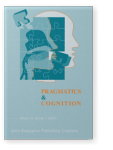Vol. 24:3 (2017) ► pp.346–372
Deliberately misleading or unintentionally ambiguous?
A cognitive linguistic view on defective codes of memory
The present paper focuses on the use of deliberately misleading or unintentionally misinformative phrases related to the so called “Polish concentration camp” issue. This problem has been gaining increasing attention in the Polish media and political sphere. In the article I present the background of the problem including the current legal situation, as well as a linguistic analysis of a selection of problematic collocations. I attempt to maintain an objective stance and refrain from passing any emotional judgement on the issue, providing, at the same time, an in-depth analysis of the linguistic data. I frame the present paper within the cognitive linguistics methodology. I combine Gilles Fauconnier and Mark Turner’s (2002) Conceptual Integration Theory with Kerstin Norén and Per Linell’s (2007) concept of meaning potentials in order to account for the emergent and modifiable nature of meanings of complex expressions.
Article outline
- 1.Introduction
- 2.“Polish concentration camps” as defective codes of memory
- 3.Methodology and data
- 4.Conceptual Integration Theory
- 5.Meaning potentials
- 6.Analysis
- 7.Final comments
- Notes
-
References
